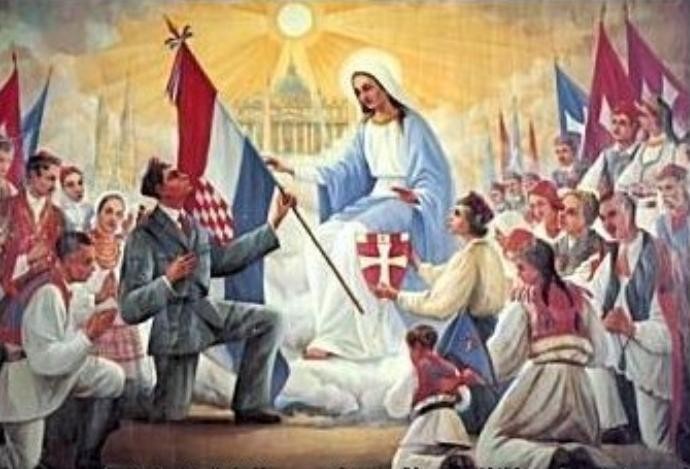Religion in Croatia

What's the religious influence like in Croatia? I can tell you that the Croatians are all peaceful, yet fervent believers.
According to the most recent census, 87. 8% of the population identify as Catholics, 4. 4% as Orthodox Christians, 1. 3% as Muslim, 0. 3% as Protestant and 6. 2% belong to other religions. The immense majority of Croatians are Roman Catholics, while the Serbians belong to the Eastern Orthodox Church, a division which dates back to the fall of the Holy Roman Empire. In fact, religion is the only variable which separates these dual heritage populations. In addition to their doctrinal differences, Orthodox Christians worship images, allow priests to marry and do not accept the authority of the Pope. It would be difficult to calculate to what extent Catholicism molds Croatian national identity. In the ninth century, the Croatians converted to Roman Catholicism and were given the right to celebrate mass and compose religious documents in their vernacular language. The Pope offered his support to the first Croatian kings, who in turn built monasteries and churches to promote the spread of Catholicism. Over the long centuries of foreign rule, the Catholic church was the unifying element which forged a sense of nation among the citizens. Unfortunately, the deep faith which stimulated Croatian nationalism was corrupted and developed into a murderous intolerance under the command of Vitase in wartime. The implication of the local churches in the cleansing of the Jewish and Serbian population lead to Josip Broz Tito banning all religion when he came to power (and with it, all nationalism, as is expected). Although religions were not officially banned, attending mass seen as being politically incorrect by ambitions Croatians. It's therefore somewhat strange that the first country to recognize Croatia as an independent state in 1991 was the Vatican.
The Church enjoys a respected position in the cultural and political life of the country, and Croatia is the object of the Vatican's special attention. Almost 76% of Croatian Catholics who participated in a survey said they were practising, and around 30% attended mass weekly. In addition to this, the Church is the institution which inspires the most confidence in the population, with the army being its only rival. There are many Croatians living in Croatia or abroad who dedicate their lives to the Church, providing new nuns and monks for the ranks of Catholic clergy.
The ex-president of Croatia, Franjo Tuđman, maintained a close relationship with the Church and signed various treaties with the Vatican establishing a link between Church and State in Croatia. The most important regulations deal with the comparison of ecclesiastical marriage with civil marriage, the introduction of compulsory religious education in schools and the reestablishment of properties which had been nationalised by Josip Broz Tito's Communist government. The Vatican's special relationship with Croatia is reciprocated - in 2003, Pope John Paul II made his third visit to the country. Since the Catholic Church is losing influence and power in the majority of secular Europe, the maintenance of the strong Croatian identity including Catholic belief has considerably increased in importance in the eyes of the Vatican. Religious festivals are celebrated with much fervor, and many people can be seen attending mass on Sundays.
Photo gallery
Content available in other languages
- Español: Religión en Croacia
- Italiano: Religione in Croazia
- Français: Religion en Croatie
- Polski: Religia w Chorwacji
- Português: Religião na Croácia
Want to have your own Erasmus blog?
If you are experiencing living abroad, you're an avid traveller or want to promote the city where you live... create your own blog and share your adventures!
I want to create my Erasmus blog! →




Comments (0 comments)